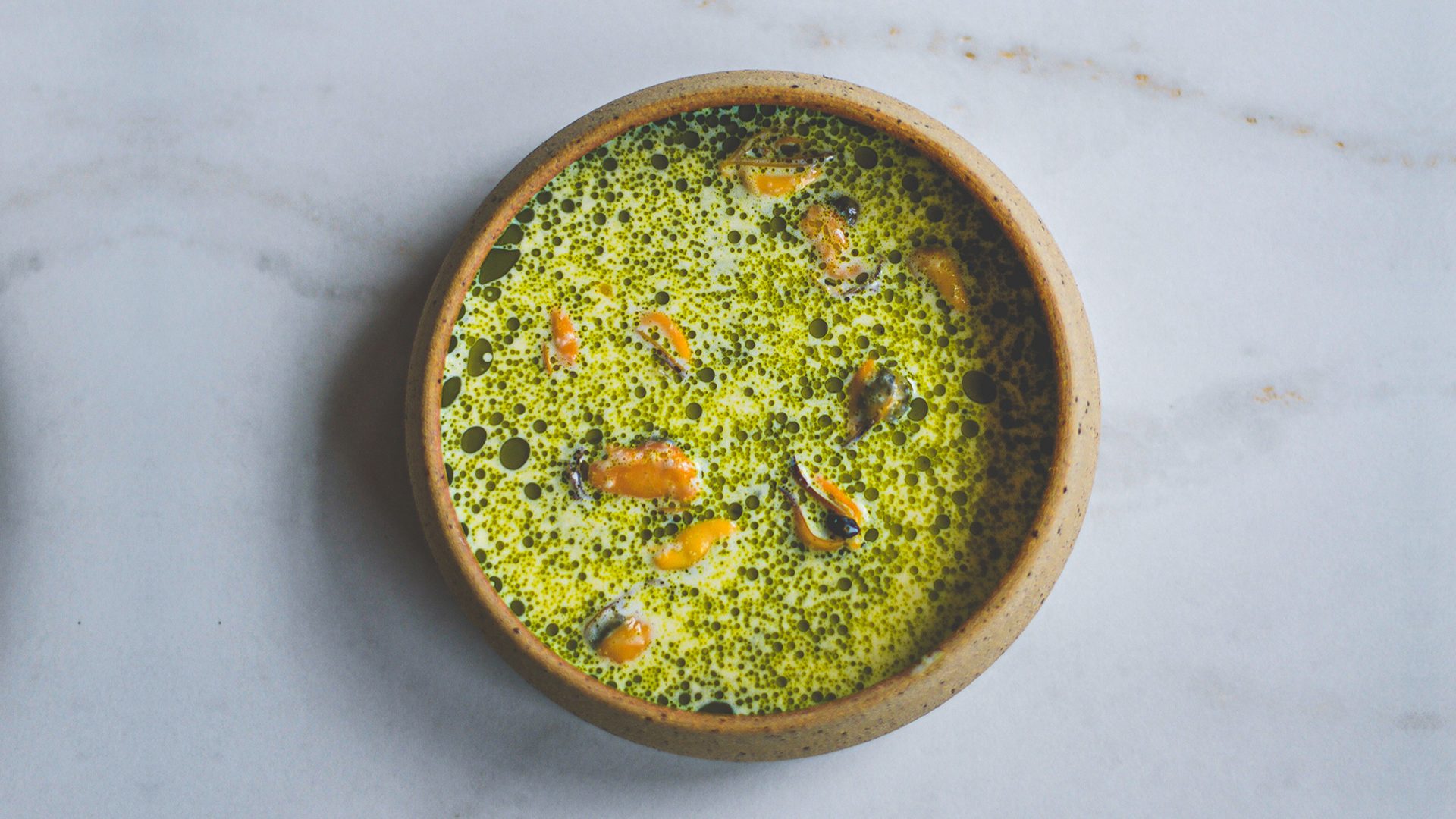What is “social fine dining”? I don’t know for sure, but it might be something to do with a more relaxed upmarket experience, where white linen is valued less than natural wine, and formality is replaced with a knowledgeable but less rigid style of service.
This is not to say the highest-end restaurants are too much. Done properly, all that refinement and sophistication manifests as a gloriously polished time at the table, and a gentle rapport is achieved in the fanciest of situations. This can feel charming indeed.
But there is room, too, for this new-fangled “social fine dining”, where food is eaten communally along long wooden tables, and elegance is achieved not by gloves and silverware but by a buzzing atmosphere, and dishes such as Dover sole with crab, Vin Jaune, and apple; or venison with chocolate, parsnips, and blackberries, capturing the embrace of autumn.
The above are found at The Water House Project, a Bethnal Green restaurant opened by Gabriel and Patricia Waterhouse. The fixture only opened a year ago, but is already beginning to make its mark on London’s oft-saturated dining scene.
Really, I suppose social fine dining has been long enjoyed in Britain, but here it is presented to us as something of a genre unto itself. Many restaurants might be counted within it – today we celebrate this one.
This week’s recipe centres on mussels: a beautiful, sustainable, constant ingredient in Britain. Gabriel serves them with fermented Jerusalem artichokes and preserved lemon, and in a mussel broth with chive oil.
This takes a while to get ready – weeks, not hours – but is well worth the effort, especially at a dinner party. You might go so far as to suggest you’re
serving your friends and family fine dining in the social environment of your dining room.
MUSSELS WITH FERMENTED ARTICHOKES
SERVES 2
Some of the preparations will give you a larger quantity than you need but can be kept in the fridge for use over weeks and months. It is best served with sourdough to mop up the broth.
For the fermented artichokes – at least 2 weeks in advance
If you choose not to ferment, you can finely dice an artichoke on the day
1kg Jerusalem artichokes (finely sliced)
1 litre water
20g salt
For the preserved lemon
6 thick-skinned lemons
1 litre water
35g salt
1kg sugar
750ml water
2 cloves garlic
3 bay leaves
1/2 vanilla pod
3 star anise
To cook the mussels
1kg mussels
1 shallot (sliced)
2tbsp fennel seeds
3 star anise
2 bay leaves
1 crushed garlic clove
2 sprigs thyme
1 glug olive oil
175ml white wine
For the mussel broth
Stock from mussels (sieved)
150ml double cream
Juice of 1 lemon
50ml preserved lemon stock (from above recipe)
4g salt
For the chive oil
1 bunch of chives (20g)
100ml olive oil
Fermented artichokes
Scrub the artichokes clean, then finely slice to 5mm thickness. Sterilise a Kilner jar by first removing the rubber seal, then heating it in the oven at 160C for 10 minutes. Dissolve 20g table salt in 1 litre of water. Remove the jar from the oven and once cool place the sliced artichokes inside. Pour the salt water over the top and place a section of parchment or clingfilm inside the jar, covering the artichokes. Submerge them under the water using a small
weight such as a stone or baking beads wrapped in clingfilm. Seal the jar and
store in a cool place. Over the coming days and weeks, gently open and close
the jar to “burp” it. This will allow the CO2 gas to escape as the fermentation
process takes place. When the jar stops “burping”, the artichokes are ready.
Preserved lemons
Cut the top and bottom of the lemons and portion into 6 wedges. Place the
lemons into a pan with the water and salt and bring to a simmer for 1 hour
until tender – it’s worth cutting a piece of the lemon skin and tasting it for the right texture, it should be tender and easy to bite without being mushy. Pass the lemons through a colander to drain, then return them to the same pan adding the sugar, water, garlic cloves, bay leaves, vanilla pod and star anise. Bring to a simmer once more, remove from the heat and leave to cool at room temperature. Store the lemons with their cooking liquid in sealed
containers or Kilner jars in the fridge. These can be kept for up to 6 months.
Chive oil
In a jug blender, blend the chives and oil for 5 minutes until the oil begins to
steam. Set a piece of J-cloth/muslin cloth or tea towel over a sieve and pass
the oil through, collecting it in a container below.
Mussels
Clean the mussels by running them under cold water for 5 minutes, removing any large bits of seaweed, then drain them through a colander. Over a gentle heat, heat the olive oil and sweat the shallot, fennel seeds, star anise, garlic and thyme for several minutes until soft. Turn up the heat, add the white wine and bring to the boil. Drop the mussels into the pan and place a sealed lid on top, give the pan a shake and cook for 3-4 minutes. The mussels are cooked once opened fully. Remove the lid, separate the mussels
from their shells and discard the shells. Pass the stock through a fine sieve into a saucepan, return the mussel flesh to the stock pan and cover with the
cream, preserved lemon cooking liquid, lemon juice and salt. Finally, dice a
handful of fermented/raw artichokes and 4 preserved lemon skins and add to the pan.
To serve
Gently reheat the mussels in the broth, checking the seasoning with salt and
lemon juice. Add a few spoonfuls of chive oil to the pan, “splitting” the cream. Spoon the mussels into your bowl, pour over the remaining stock
and spoon over a little more chive oil.




